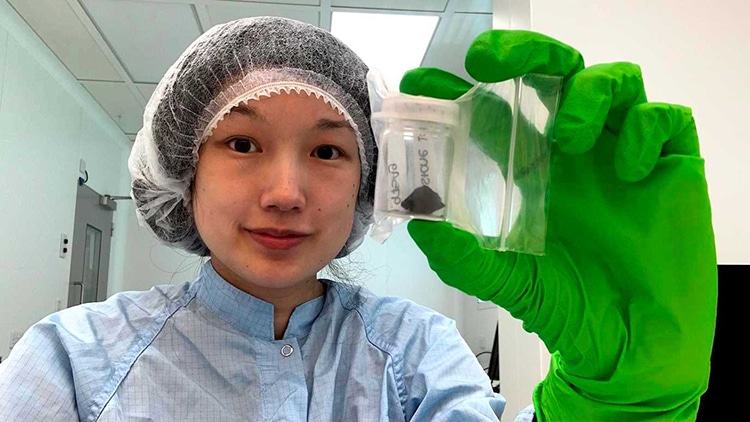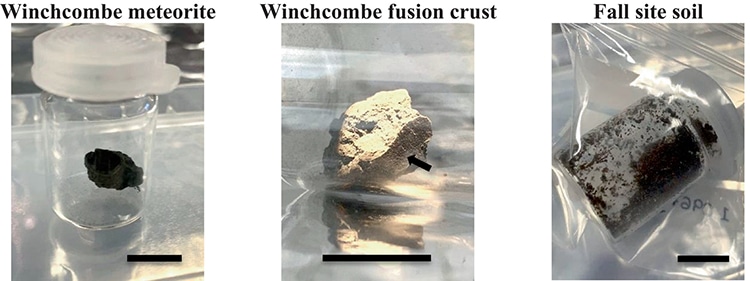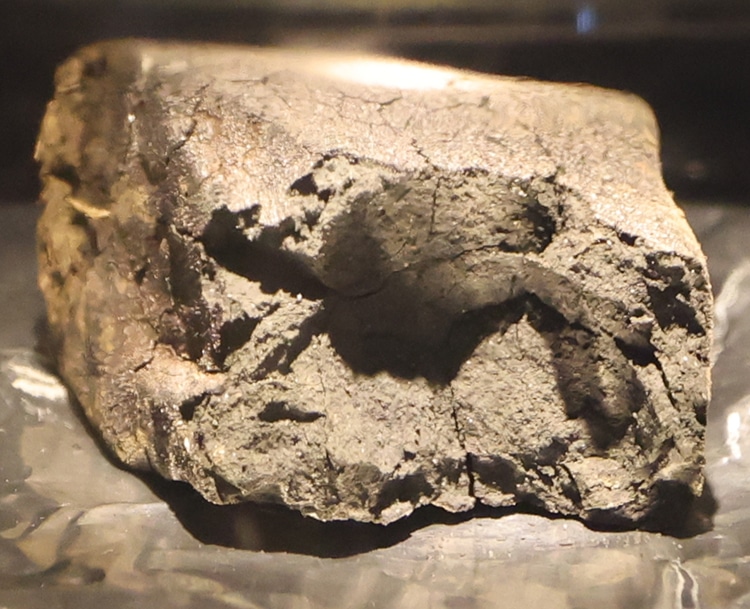
Dr. Queenie Chan holds up all small piece of the Winchcombe meteorite. (Photo: Royal Holloway, University of London)
Meteorites are chunks of space rock that make it through our atmosphere to land on Earth. When quickly identified and recovered, the extraterrestrial rock can tell astronomers a lot about the composition of the universe and even how life began on Earth. Meteorites can show evidence of minerals not seen on our planet or what looks like fossilized bacteria from Mars. The Winchcombe meteorite, which fell in the UK in 2021, has been tested to reveal amino acids—the building blocks of life on Earth. As recently described in a paper in Meteoritics & Planetary Science, the unique rock may represent a new class of meteorite.
The Winchcombe meteorite fell into a driveway on February 28, 2021. The piece of rock is much smaller than most meteorites, weighing only 1.3 pounds split into four pieces. Its fall was tracked by a fireball tracking network and within 12 hours the rock was recovered and conserved for study. This means the sample was relatively uncontaminated by the Earth’s environment. The pieces quickly revealed exciting findings: the meteorite contains extra-terrestrial water, which hints at where our oceans originated. The meteorite is also a rare carbon-rich chondritic meteorite (this type accounts for about four percent of all recovered meteorites).
A sample of the meteorite was tested by researchers under Dr. Queenie Chan at the Royal Holloway University of London. The team noticed the presence of amino acids, aka the building blocks of life on Earth. These organic compounds have been found in other meteorites, but here they appear at a lower concentration. The amino acids and polycyclic aromatic hydrocarbons (PAHs) are within measure at just 1.1 and 6.2 parts per million, respectively. There is also an unusual ratio between these two materials. The meteorite does not seem to have transformed completely into solid rock. All these factors suggest to the researchers that the Winchcombe meteorite might be a kind that was previously unknown. The structural weakness also likely is the reason so little rock survived to Earth.
“Studying the organic inventory of the Winchcombe meteorite provided us with a window into the past, how simple chemistry kick started the origin of life at the birth of our solar system. Discovering these life’s precursor organic molecules allowed us to comprehend the fall of similar material to the surface of the Earth, prior to the emergence of life on our own planet,” said lead author, Dr. Chan, in a statement. “It was an honor to be leading the team on the organic analysis of the first ever successful carbonaceous meteorite recovery in the United Kingdom. It was a pleasure and an exciting journey to be working with highly skilled and enthusiastic scientists across the country.”
The Winchcombe meteorite, a space rock that fell in the UK in 2021, has been tested to reveal amino acids, the building blocks of life on Earth.

A sample of the meteorite, its fusion crust (see arrow), and fall site soil. (Photo: Chan et al.)
The meteorite was also recently discovered to hold an extraterrestrial form of water, and the entire find suggests a new kind of meteorite.

A chunk of the Winchcombe meteorite, held in the Natural History Museum in London. (Photo: Wikimedia Commons, CC BY-SA 4.0)
h/t: [IFL Science]
Related Articles:
Nicole Aunapu Mann Makes History as the First Native American Woman in Space
50 Years Ago, We Discovered the Earth Through the Iconic ‘Blue Marble’
James Webb Space Telescope Releases Stunning New Shot of the Pillars of Creation
14 Famous Astronomers That Any Lover of the Cosmos Needs To Know
